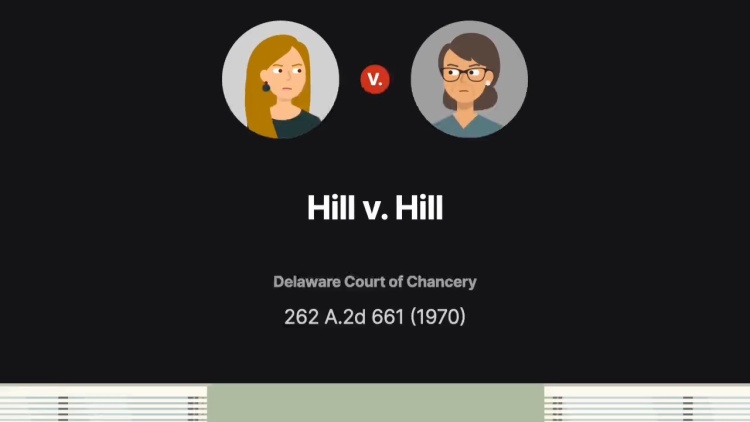Hill v. Hill
Delaware Court of Chancery
262 A.2d 661 (1970)
- Written by Tammy Boggs, JD
Facts
Sara Hill (plaintiff) signed a prenuptial agreement with Harry Hill in Maryland under which each agreed to take certain actions with respect to his or her separately owned real property, stocks, and/or life insurance policy. For example, Harry agreed to convey all his real property to him and Sara together as tenants by the entireties within 30 days after their marriage. The agreement was not executed in front of at least two witnesses. The day after Sara and Harry signed their prenuptial agreement, they married. During the marriage, Harry did not convey his Delaware property to him and Sara as tenants by the entireties. Less than two years after getting married, Harry died in Delaware. Under Harry’s will, the Delaware property was to be divided in equal parts between Harry’s mother, sister, and brother (defendants). Sara brought an action in Delaware against the family members to enforce the prenuptial agreement. The family members moved to dismiss the complaint. Sara’s ability to proceed depended on whether the law of Maryland or Delaware applied to the contract. Under Delaware law, a prenuptial agreement had to be executed in the presence of two witnesses at least 10 days before marriage. Maryland did not contain such a requirement.
Rule of Law
Issue
Holding and Reasoning (Duffy, J.)
What to do next…
Here's why 907,000 law students have relied on our case briefs:
- Written by law professors and practitioners, not other law students. 47,100 briefs, keyed to 996 casebooks. Top-notch customer support.
- The right amount of information, includes the facts, issues, rule of law, holding and reasoning, and any concurrences and dissents.
- Access in your classes, works on your mobile and tablet. Massive library of related video lessons and high quality multiple-choice questions.
- Easy to use, uniform format for every case brief. Written in plain English, not in legalese. Our briefs summarize and simplify; they don’t just repeat the court’s language.





